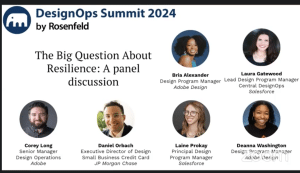Day 1 Session Notes–The Big Question about Resilience: A Panel Discussion

Moderator
- Bria Alexander (BA)
Speakers
- Corey Long (CL)
- Daniel Orbach (DO)
- Laine Prokay (LP)
- Deanna Washington (DW)
- Laura Gatewood (LG)
Panel
- BA: First would like to congratulate all on presenting today and reflect on themes of the day
Initial Questions
- What are key elements of resilient DesignOps team? How to build resilience in day-to-day processes?
DO: Funny in that questions around DesignOps team, but think about flexibility in terms resilience
- Mindset— Flexible mindset as a person and tools to respond well when things change
- Within team great communication is key for flexibility to lay expectations for change, and space for talking about change happening ot them
LG: Start with kindness and think about experience people need to have so that they have inner flexibility
Corey: DesignOps teams are often small, and lot of impact comes from influence and best way to achieve that is show benefit of what you are trying to put out there for your teams
- Leads to empathy and resilience, and important to have empathy for being willing to iterate and improve
- Help teams understand and focusing on making life better for you and products you are building
- In DesignOps give so much to teams, so how do you take care of yourself for you to stay resilient?
LP: Energy management is not time management. You might see person’s x working hours, so listen to yourself
- If not executing to best abilities, ask how to get energy back vs time back
DW: Two pieces to it
- Think how feedback is data and not a personal attack, and take it all in
- Double down on documentation, so make sure your role is clearly spelled out and how to improve or update something
- How to. support resilience for teams and how processes can support that?
DO: Something think about a lot
- How to model healthy-working norms and boundaries. Doing just silly stuff like norms or when to contact people on team outside of working hours
- Like taking time off August
LG: To Daniel’s point on modeling, view behavior as implicit messaging to impact resilience on team
Corey: As manager try to balance if working on something that gives you energy and is it balanced with what needs to zap energy and tedium of DesignOps
- Modeling and know when to say no and present that to your team
- How to build culture and processes to cover different ways of working from introversion to massive extroversion?
DO: This starts when you build the team. We should be committed to maintain neurodiversity and personality diversity
- Shouldn’t have 6 extroverts and 1 introvert
Second listen to the team, and ask what works for them and what doesn’t. Make implicit signals explicit through conversation, to understand when things are out of balance
Manage to outcome versus output
- Don’t dictate shape of thing, but here to support you and outcome from you and how to do this together
LP: Allow time for people to prepare ahead of time or answer later and think through questions
- Prep ahead of time for workshops and keep open for a week and see things trickle in, and say things out loud
- How do you see AI impacting and improving experience?
DW: Having an AI to give ideas on how to measure success and using AI to help my work with user research and data collected
LP: Reiterate things I said in my talk with Laura, using as editor or drafter, and having it answer ‘how might we’ questions
LG: Saw someone post in general chat to have AI as student to practice messages and have AI evaluate your messages
- Use it to double-check writing and pick-out the themes, and getting point we are trying to make
DO: Slightly different approach and context of AI model is how much junk to put in and output
- Wondering what would it mean if you had an AI team-mate and what that would mean for how teams would operate
- Probable or likely future
- See opportunities to use AI as tool in context and moderate retrospective, and have it facilitate ceremonies and time tracker, along with re-capping a summary and notes
- What would it mean for AI to be team-mate that did laundry?
- GPTs to help with sheer volume of reading and analysis
Corey: Popular topic, but didn’t use AI that much and customize cover letters, as I value my voice and writing
- AI is great tool, but not human replacement
- AI tools help you get interview and application out—but interview requires your own voice to help you stand out
- Anything else to share?
— No
- If resilience in UX design would be superpower what would you name be?
DO: Captain Co-Creation
LE: Super-Bonder
DW: Captain Calm Confidence
Corey: Phoenix
LP: Super-Communicator

